Startups developing the seafood experience without a catch, a next generation district heating design software, a software for the analysis of spectroscopic data, alpine solar energy, and digital twins for connected mobility each win CHF 10,000
22.03.2023
catchfree, Planeto, RefFIT, SUNWELL, and Transcality win Venture Kick's first stage of financial and entrepreneurial support. Their projects employ a versatile and scalable technological platform to structure nutritious food formulations, develop a thermal energy system simulation assistant to decarbonise the heating energy supply in buildings, provide a complete no-code model-based analysis solution reducing the need for lengthy calibrations in material analysis, aims to revolutionize the planning, execution and operation of solar photovoltaic (PV) projects, and build a digital replica of traffic coupled with ready-to-use simulation that enables to model future scenarios.
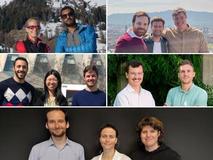 |
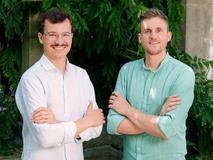 Catchfree founders Lukas Böcker and Severin Eder
|
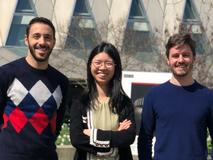 Planeto: from left to right CEO & Co-Founder Stefano Cozza, Data Scientist Xiang Li, and CTO & Co-Founder Jonathan Chambers
|
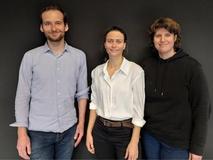 RefFit co-founders Dr. Willem Rischau, Dr. Iris Crassee, and Dr. Nicole Ruckstuhl
|
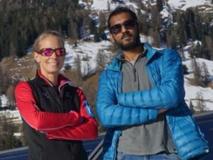 SUNWELL: Annalen Kahl and Varun Sharma
|
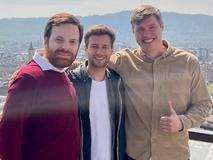 Transcality: Sasan Amini, Lukas Ambühl, and Gabriel Tilg
|
catchfree: Delivering consumers the seafood experience without a catch
Sustainable and environmental cautious food consumption is a mega trend in our societal development. Consumers demand vegan alternatives in every food category including the seafood sector. Yet, current offerings do not fulfil all essential characteristics of seafood – leaving the consumer with a catch. The consumers sacrifice part of their experience to support ecological causes and animal welfare.
catchfree addresses this market employing a solution without a catch offering a vegan shrimp with authentic taste, shape, texture, and nutritional profile. The startup founded by Severin Eder and Lukas Böcker from the Swiss Federal Institute of Technology Zurich (ETH) strives to deliver consumers the seafood experience without a catch – neither in an ecologically harmful way nor in missing out on appearance, taste, texture, or nutritional benefits. They employ a versatile and scalable technological platform to structure nutritious food formulations and address the market whitespace first in Switzerland then in Europe. Their primary customers are specialty restaurants with whom they cocreate recipes and specific use cases. Retailers and online sales will be targeted after the gastronomy sector.
To support and prepare their go-to-market, they plan to use the Venture Kick funding primarily for initial marketing activities including online representation with a website and social media coverage and to propel business development activities towards their launch in restaurants.
Planeto: Next generation district heating design software to accelerate the energy transition
Decarbonising the heating energy supply in buildings is an urgent need to meet global climate and energy security targets. District heating and cooling networks (DHC) is recognised as an essential solution because it allows to connect buildings to renewable energy sources. However, adoption of the technology is very low. Energy utilities and public authorities struggle to plan and develop new DHC projects.
Planeto's Thermal Energy System Simulation Assistant (TESSA) software addresses this exact problem, by digitalising DHC planning. It combines comprehensive building stock geo-data and modelling with an innovative algorithm for DHC network route planning. It allows a user to initiate a DHC model within a few minutes, by embedding data and knowledge in the platform transparently for users. The current team consists of the two co-founders Stefano Cozza and Jonathan Chambers, and the team member Xiang Li. Both co-founders are still researchers at the University of Geneva's Energy Efficiency Group. TESSA provides several technical innovations. The modelling input data can be generated for entire countries which allows a project to be started immediately without a data collection step, saving a significant amount of time. TESSA is built as a set of software modules based on our validated methodologies, integrating both state of the art building physics knowledge and machine learning methods. This increases the reproducibility and decreases uncertainty. The algorithms developed for thermal network routing and energy supply/demand modelling are faster and more flexible than existing methods. In terms of market potential, recent developments in climate policy as well as geopolitics have spurred interest in transition away from fossil fuels in heating. Globally the DHC market is expected to grow by USD 40 billion in the next 5 years, while in Switzerland the heat supplied by DHC must grow 10x to meet the Energy Strategy 2050 targets.
They will use the Venture Kick funding for business development such as sales, marketing and IP strategy, and for IT development, providing the software in a cloud environment and meeting industry cybersecurity standard.
RefFIT: Software for the analysis of spectroscopic data
Spectroscopic data contains essential information on material type, properties, concentration and quality but is notoriously difficult to analyze due to the complex nature of light and its interactions. Therefore, some companies develop ad-hoc inflexible custom codes, but most companies employ calibration curves, statistical methods or data-driven machine learning. These are expensive “black-box” analysis methods, requiring lengthy data-calibrations with limited predictive power. In addition, valuable information contained in the spectra is lost due to the simplified, inaccurate approach.
RefFIT is a software for the analysis of spectroscopic data in material science, used by customers for product and process development, quality control and sorting in industries like manufacturing, semiconductor and photonics and recycling. The co-founders are Dr. Iris Crassee, Dr. Nicole Ruckstuhl, and Dr. Willem Rischau, all are senior researchers at the science faculty of UNIGE. RefFIT contains an extensive library of scientific models, linked and easily customizable thanks to techniques inspired by machine learning. They provide a complete no-code model-based analysis solution reducing the need for lengthy calibrations in material analysis. With RefFit, complex spectroscopic material analysis becomes easy, fast, more accurate and accessible to all potential users. Their software significantly reduces the time to analyze data and build new models thereby enabling new applications, previously too complex and costly to develop. The global market for spectroscopy analysis software was USD 200 M in 2023 and shows an 11% annual growth.
They plan to use the Venture Kick funding in the first 3 months on business developments activities and on marketing strategies and communication solutions. reffit.ch
SUNWELL: Alpine Solar Energy
In the ongoing transition to renewable energies, solar Photovoltaics (PV) takes a leading position, but the solar industry inherits all the legacy issues of traditional infrastructure development - it is extremely inefficient with little digitization and has relative rising costs.
To solve this problem, SUNWELL is building SolarSherpa, a software solution that aims to revolutionize the planning, execution and operation of solar photovoltaic (PV) projects. The three co-founders are CEO Varun Sharma, COO Annelen Kahl, and Advisor Michael Lehning. They are part of the ESA BIC program. SolarSherpa integrates all planning and design steps into one efficient optimization process and generates a digital twin that guides the life cycle of the solar project. The innovation and novelty lie in integrating various technologies in one cohesive, robust software platform. They use satellite-derived radiation data in combination with large geospatial and meteorological datasets to identify optimal project locations. The computations leading to the optimal design of a solar project include an extensive set of cutting-edge scientific models (developed-in house) and make use of HPC computing, ray tracing and computational solid geometry. The code itself will be made open source. Faster, cheaper and most productive, this solution will accelerate the energy transition and addresses a multi-billion market world-wide. As the startup scales up, it will target increasingly larger markets; from the Swiss market for design and engineering to all alpine regions and eventually to provide software as a service to the global digital solar market which currently has an annual market size of USD 20 billion.
The team plans to use the Venutre Kick funding or product development, marketing and hiring.
Transcality: Digital twins for connected mobility
Transportation networks are vital to economies, but urbanization and disruptive mobility concepts increase pressure on infrastructure. Real-time monitoring, testing, and implementation tools are paramount, but current practices rely on traditional data collection and laborious engineering processes. Current solutions lack transparency and traceability, with isolated partners and too many individual transportation models leading to slow, costly, non-inclusive, low-quality, and quickly outdated approaches.
Transcality utilizes big data, cloud computing, machine learning, simulation, and automatization to efficiently create digital transportation twins. This will result in affordable and quickly updated products/services which can be perfectly integrated into flexible transportation planning. The three co-founders are Lukas Ambühl from ETH Zürich, Gabriel Tilg, and Sasan Amini. Their customers are public authorities (local, regional, and national level) and engineering companies. Expedient transportation planning is key to lower associated emission. Ultimately, the startup can thereby contribute to creating a sustainable future.
With the CHF 10,000 from Venture Kick, the team will allocate funds towards further development of the API platform, such as hiring additional developers to improve the user interface and add new features. Additionally, a portion of the funds will be used towards marketing efforts to increase visibility for their city visualizations and broaden their customer base. transcality.com


